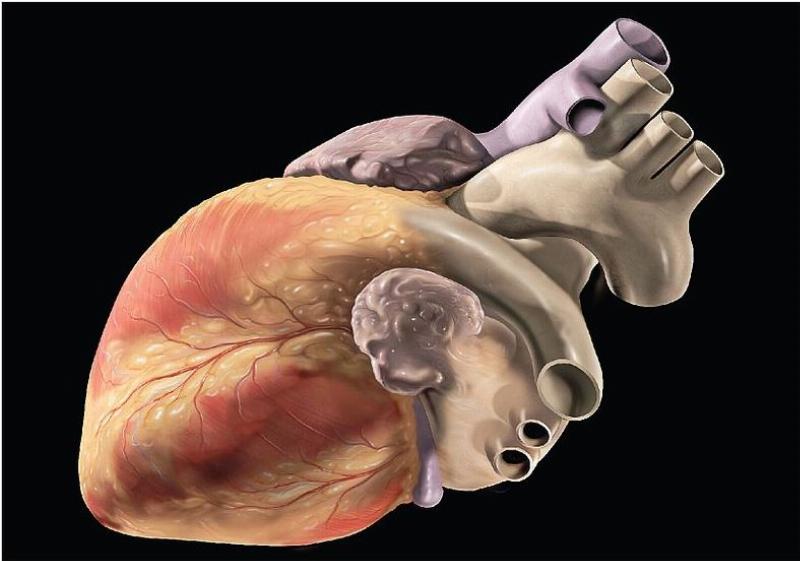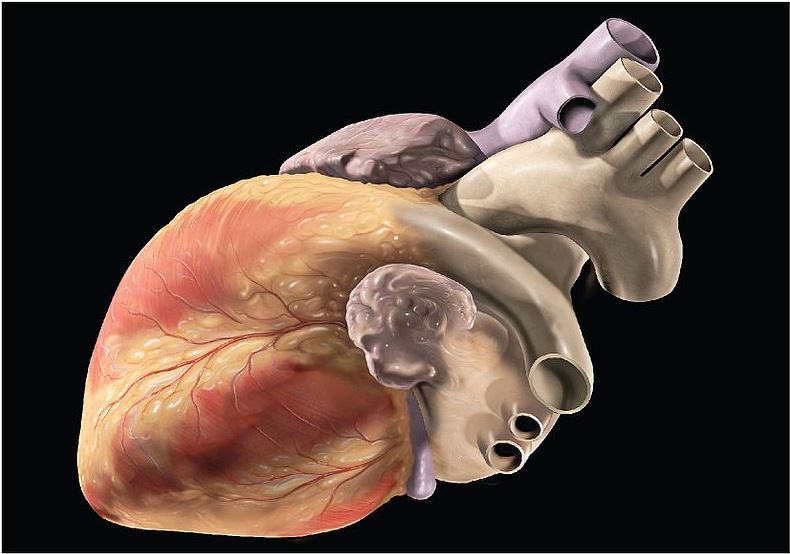

Photo Credit:Human heart.
stax via wikim cc4
The CDC claims there's nothing to see around the issue of vaccinated young athletes suddenly dropping dead.
Stung by media reports of young athletes dropping dead seemingly often and everywhere, and sensitive to the claim that studies relying on the passive VAERS reporting system drastically underreport vaccine events including deaths, the CDC looked at Oregon death certificates in an effort to eliminate reporting bias on COVID-19 vaccination deaths. Here are excerpts of the abstract of its April 11, 2024 study:
COVID-19 vaccination has been associated with myocarditis in adolescents and young adults, and concerns have been raised about possible vaccine-related cardiac fatalities in this age group…To assess this possibility, investigators searched death certificates for Oregon residents aged 16–30 years who died during June 2021–December 2022 for cardiac or undetermined causes of death. For identified decedents, records in Oregon’s immunization information system were reviewed for documentation of mRNA COVID-19 vaccination received ≤100 days before death…No death certificate attributed death to vaccination. These data do not support an association between receipt of mRNA COVID-19 vaccine and sudden cardiac death among previously healthy young persons. COVID-19 vaccination is recommended for all persons aged ≥6 months to prevent COVID-19 and complications, including death.
I know exactly what you’re thinking: “There needs to be a quick and devastating published take down of its premises. I don’t see anything like that on line yet — is it underway?”
Answer: Yes, right here.
The CDC admits there is a small probability of COVID vaccine-induced myo- or pericarditis (henceforth “myo”), see, e.g., here and here, but it can’t get itself to admit there is any measurable risk of COVID vaccine-induced myo death, even to the point of dishonesty. So let’s do the calculations ourselves.
In an Israeli Pfizer study appearing in the October 2021 NEJM, the myo incidence for those aged 16-29 (virtually identical to the age group in the Oregon study) with at least one dose is 5.49 per 100,000, or 1 in 18,215.
A large European study appearing in the December 2023 IJC Heart & Vasculature which used the EudraVigilance database on 708 million doses of COVID vaccines of all brands administered in the EU/EAA found that the myo incidence for Moderna is about 1.8 times that of Pfizer and the other vaccines.
So let’s adjust the myo incidence found in the Israeli Pfizer study by assuming the Pfizer(+other)/Moderna usage split in the USA is about 76/24 (based on Table 2 in the European study). Then we can assume the vaccine-induced myo incidence for ages 16-30 in the USA is about (0.76)(1/18215) + (0.24)(1.8/18215) = 1 in 15,281.
The European study found the vaccine-induced myo death rate for all ages to be 1 in 129. We know myo incidence is heightened among young adults, but there is conflicting information as to whether, compared to other age groups, their myo death rate is higher (e.g., Korean study, all 8 cases of sudden cardiac death out of 21 total myo deaths were under 45) or lower (U.K. study, 68.7 mean age of myo deaths; Nordic study finding zero myo deaths under 40), so we’ll just stick with 1 in 129 for ages 16-30. Then the probability that someone aged 16-30 dies from vaccine-induced myo is (1/15,281)(1/129) = 1 in 1,971,249.
Using June 2020 Oregon demographic data and appropriately interpolating the given age groups, the population estimate for ages 16-30 is 708,365.
Based on this and this, assume that 70% of them, or 495,856, had at least one dose during the CDC’s Oregon study time period. Then we’d expect to observe 495,856/1,971,249 = 0.25 vaccine-induced myo death (even lower if we account for incomplete and unavailable data as detailed in the CDC’s Oregon abstract), which rounds to zero deaths (this remains true even if we almost double the death rate to 1/65 or use 100% instead of 70%). This shows that making conclusions about vaccine-induced myo deaths based on Oregon alone is fallacious.
Using nationwide demographic data and appropriately interpolating the given age groups, the nationwide population estimate for ages 16-30 is 66,077,100. Assume 70% of them, or 46,253,970, had at least one dose in the CDC’s Oregon study time period. Then we would expect about 46,253,970/1,971,249 = 23.5 vaccine-induced myo deaths nationwide among ages 16-30 in that time period. (Based on reports at the time that doctors and coroners nationwide were under pressure not to state “COVID-19 vaccine” or even “myocarditis” as the cause of death, as well as data limitations, I’m guessing the true number is higher.) So maybe (some of) those fatalities that made the news were indeed vaccine-induced myo deaths.
The Limitations section of the Oregon study says the following:
The findings in this report are subject to at least two limitations. First, this report cannot exclude the possibility of vaccine-associated cardiac deaths >100 days after COVID-19 vaccine administration. However, published data indicate that potential adverse events associated with vaccinations tend to occur within 42 days of vaccine receipt (10). Second, small population size made it less likely that Oregon would see a rare event such as sudden cardiac death among adolescents and young adults.
The first limitation compares favorably with the literature and is of no concern. But the second limitation about small population size, predictably ignored by the media, should have precluded this being published as a “study” concluding “no association” in the abstract and repeated in the “Implications for Public Health Practice” section; instead it should have said the sample size was too small to reach such a conclusion. Doesn’t the CDC know this? Of course it does.
Why do such small probabilities matter? Because contrary to the findings in some studies, several others have concluded that at least for some subgroups, e.g., young adult males after a second dose of Moderna, the risk of COVID vaccine-induced myo or even myo death may be higher than after COVID-induced myo. According to the European study, “Our study shows that the mortality of COVID-19 vaccine-related myocarditis is higher than the mortality associated with myocarditis caused by the COVID-19 infection [99],” a bombshell conclusion inexplicably buried on page 7. So while the bulk of the published research suggests vaccination for all age groups is preferable, there is at least room to debate the CDC’s cookie-cutter stance that just about everyone should be vaccinated equally.
Despite zero expected vaccine-induced myo deaths, here are the lapdog media headlines covering the Oregon study:
USA Today: No link between COVID vaccine, cardiac arrest in young people, new CDC study finds
Yahoo News: CDC report finds no link between COVID vaccine and sudden cardiac deaths in young adults: Your guide to the latest virus updates
Do the MSM collude with the CDC, or are they just willing stooges? You can almost see them gleefully shouting, “Take that, you ignorant, gun-toting, bible-clinging, anti-vax, MAGA rednecks!” But the joke is on them. Journalists who automatically spit out whatever the CDC says without any critical analysis are not science reporters, they’re just science report summarizers.
W.A. Eliot is a pseudonym.
Image: OpenStax Anatomy and Physiology via Wikimedia Commons // CC BY 4.0 DEED





